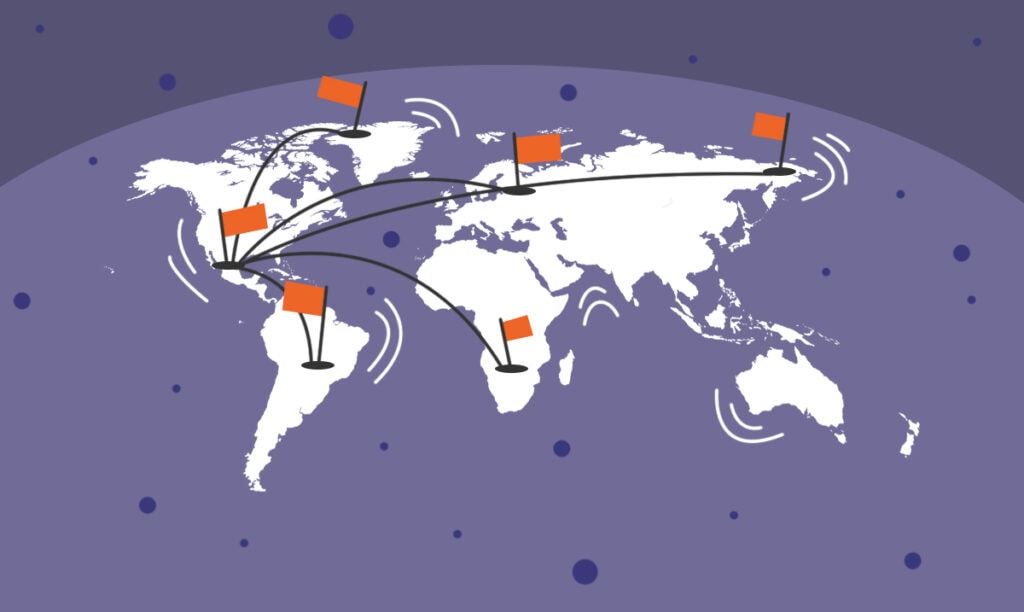So a project can feel totally wrapped up. The final files got delivered, the last invoice got paid, everyone did the polite “great working withyou ...
Insights on Global Expansion for Startups
Written by: Carolyn Young
Carolyn Young is a business writer who focuses on entrepreneurial concepts and the business formation. She has over 25 years of experience in business roles, and has authored several entrepreneurship textbooks.
Published on June 12, 2024

Embarking on the journey of global expansion can be both exhilarating and daunting for startups. As they navigate unfamiliar territories, entrepreneurs often seek wisdom from those who have ventured before them. In this article, we distill the collective insights of seasoned entrepreneurs who have successfully expanded their ventures across borders.
Embracing Global Vision and Local Adaptation
When we first considered expanding globally, we had a copy-paste mentality. Big mistake. Every new place we entered had its own rhythm and flavor. We had to customize our offerings — from the product to marketing messages — to resonate with each local audience. It wasn’t just translating words; it was translating the vibe.
This whole when in Rome approach worked wonders. It’s like being a guest in someone’s home — you respect the house rules. This doesn’t just open doors; it builds bridges. So, for startups with international ambitions, my advice is not just to go global; go local global. Tailor yourself to each market while retaining your core identity. Success comes from embracing both global vision and local adaptation.
Nathan Jacobs, senior researcher at The Money Mongers
Strategic Market Selection
Start with the countries where you’re most likely to succeed. Software startups with product/market fit usually get sales from lots of countries without even trying. But getting a few sales from early adopters in France doesn’t mean you can make inbound ads or a sales hire profitable. The best approach is to pick off the few areas where English is widely spoken, and GDP is high. In Europe, that’s the UK and Ireland, the Scandinavian market, and Benelux (Belgium, Netherlands, and Luxembourg). Asia, Australia, New Zealand, and Singapore are the best starting points for most companies.
Brian O’Sullivan, business growth consultant & founder of DataLed
Harmony between Business and Passion
One of the key lessons I’ve learned from expanding globally is balancing business with passion. It’s clear that we’re all passionate about what we do, but I’ve realized how vital it is to balance that passion with smart business strategies. Having a great executive team has made it possible for me to focus more on the business side, which is essential for long-term growth. This balance is essential for startups eyeing global expansion because it ensures that while the passion propels innovation and creativity, sound business strategies provide the necessary structure and scalability to navigate the complexities of entering new markets, complying with regulations, and establishing a strong global presence. This balance also allows for better decision-making, as it combines creative energy with a focus on the financial and operational aspects of expansion.
Syed Lateef, hospitality expert & CEO of SyedBNB
Navigating Diverse Landscapes
Expansion is far from the simple replication of success in new locations. It necessitates a deep comprehension and adaptation to each region’s unique regulatory environment, consumer behavior patterns, and prevailing health trends. As an example, our probiotic supplements were very successful in the US, yet we had to reformulate them so they could meet rigorous health claims legislation set by the European Union. This lesson cost us nearly $200,000 for compliance measures and testing (that underscores how crucial thorough market research, along with advice from local legal experts, truly is).
International logistics present both challenges and opportunities. We initially struggled with supply chain issues, so our operational costs skyrocketed by 15%, and delivery times elongated significantly. We established partnerships with local distributors and invested in regional warehousing to remedy this. This reduced shipping durations by 30% and cut our costs by 20%. Consequently, our customer satisfaction rates increased.
James Wilkinson, co-founder & CEO of Balance One Supplements
Choosing the Right Shipping Carriers
We are a small jewelry business that expanded globally about two years ago. The biggest challenge was figuring out the shipping carriers to use by country. We found out that many countries favor one delivery method over the other. We started with our 10 most popular countries (traffic-wise) and researched to find the best carrier for each. Then, we expanded from there. You don’t know how many times a customer outside of the US reaches out and thanks us for offering the carriers we do. We believe this strategy was what helped us increase conversion rates and overseas sales.
Jeffrey Michael Moriarty, digital marketing director at Moriarty’s Gem Art
Embracing an International Mindset
These days, it’s simpler than ever to go global as a start-up — you should make sure you are cultivating an international mindset and culture from day one. Don’t ever assume that just because you can sell a product or service globally online, you won’t need to localise the offering or the way that you market to your ideal clients. There may be completely different legal frameworks that oblige you to make changes to the way you work, payments may work differently, and client expectations will almost certainly not be identical. Just because things are simpler than in the past doesn’t make them necessarily easy.
Kathryn Read, international sales and marketing consultant at KathrynRead.com
Leveraging International SEO
In order to have limitless growth as a business, global expansion is an essential factor that every organisation should strive for.
As a fast-growing business with increasing potential, we at Sherbet Donkey work towards improving our acumen within the international market. Therefore, we have multiple strategies that have served us well in building our worldwide presence, our international SEO approach being one of them.
SEO is now a vital cog in every successful business, and the main target everyone is aiming towards is bettering their rankings on popular search engines (Google, etc.). To achieve this, we hone in on specific keywords and utilise them within our blogs. Cultural differences, such as the local language they use, are manipulated to appeal to the target audience, as well as a variety of other important aspects.
Each country or region requires its own unique methods of conquering search results, so it’s important to delve deep into those for every area. Does the product appeal to that area? How can you attract interest there? What are their cultural norms?
Furthermore, subdomains and international URL extensions can also provide you a global platform. Using .fr for France, for example, will instil trust within the customer that you’re a trustworthy source.
Lucy Hurst, managing director of Sherbet Donkey Media
Having a Multi-National Team
One aspect that has really helped us expand is that although we are a small team, we are a global team. Our multi-national team is made up of globetrotters who have experienced living and working in different countries throughout their careers. Having such a wide range of international experience between us has so many benefits. It means we get different perspectives and can quickly tap into local networks.
I can’t imagine trying to navigate international markets if the majority of your team is of one nationality and based in one country. We work remotely and are based all around the world, and although working across time zones brings its own challenges, it means that there is always someone available 24 hours a day, and we always have someone on the ground with local knowledge and connections in each of our locations.
Ryan Walker, CEO of Beyond Academy
Navigating Language Obstacles
Your progress may be slowed down by language obstacles. Don’t presume your target market knows your native language if you are the only one making content in that language.
You may translate your information into another language by using location-detection software. If you want to create numerous language versions of your website, think about hiring a freelance translator or using the countless tools already available.
Starting in English-speaking nations is an excellent choice until you feel ready to go on to other languages.
Harrison Tang, co-founder & CEO of Spokeo
Start Small
The key insight I’ve gained is the value of starting small and scaling strategically. At Cullen Jewellery, our first step towards international expansion was offering free international shipping. This might seem like a small move, but it was a calculated trial balloon to gauge global interest without overextending our resources. The response was overwhelmingly positive, confirming a strong demand for our products beyond Australia.
Encouraged by this success, we’re now gearing up to open our first US showroom this year. This gradual approach allowed us to understand and adapt to new markets with minimal risk, learn from our clients, and build a solid foundation for sustainable growth. Starting small helped us test the waters, refine our strategies, and ensure we were ready for the next big leap.
Jordan Cullen, founder of Cullen Jewellery
Market Selection
We cracked global expansion by meticulously choosing key markets and targeting regions that synced with our mission and model — offering jobs and secure payments regardless of location. We pinpointed four markets based on startup support, language, and funding access, catering to both budget-conscious startups and CSR-driven corporations. Building trust was key, so we adopted a hybrid approach — leveraging remote work for global reach while hiring locally for cultural sensitivity. We also adapted our tech, UI, and marketing to meet diverse preferences, from Swiss privacy concerns to South Korea’s premium demands.
Lilia Stoyanov, CEO of Transformify
Be Proactive
Being proactive rather than reactive is more effective when expanding internationally. You may have difficulties while responding to emergencies if you do not have a plan in place for your worldwide expansion. Proactive thinking is crucial for worldwide expansion, even when a reactive strategy could be effective in your own nation. Get ready for the unknown market’s prospects and difficulties. To ensure the success of your worldwide growth strategy, develop a long-term plan, recognize the challenges that are likely to arise, and take proactive measures.
Brian Jones, co-founder & contributing editor of Best in Edmonton
Translating Your Website
Our method of expanding internationally was going multilingual.
How it works: Translate your website to appear in other countries’ search results.
Why startups will like this method:
- Fast setup — the entire process takes just 1–3 days
- Small investment — approximately $100 a year
- Minimal effort — most of the work is already done (building a site, publishing content, etc.)
Business advantages:
- Enter multiple markets at once
- Unlike temporary ad campaigns, translations last forever
- Attract consistent visitors with a one-time setup
Tomer Helzer, partnerships at WPML
Strategic Networking
My go-to strategy for global startup expansion has always been building, growing, and leveraging professional networks across multiple spheres and channels. For example, here at Belkins, we like to say that each and every one of us has a valuable professional network to leverage, whether that be to improve our work results, expand our client list, strengthen our brand image and reach, or touch base with an important business connection or a partner crucial to our growth.
Build a team that’s incentivized and driven to build, grow, and leverage its professional network across multiple shares and channels, and watch your growth and influence skyrocket in just a few short years.
Michael Maximoff, co-founder & managing partner at Belkins
Having Local Partners
Global expansion is a complex but rewarding move. While you can go it alone, in most cases, I’d recommend partnering with companies in the markets you want to enter to form a powerful strategic alliance. You benefit from another company showing you the ropes and combining resources to achieve a common purpose. You give up some control and must compromise to make partnerships work, which can sometimes be difficult across borders, cultures, and individual business goals.
A strategic partnership isn’t something you should leap into blind, but take a slow and steady approach to vet each other and get on the same page before you decide to move forward. In some countries like Saudi Arabia, you’re legally bound to have a local business partner, but even in countries without those operational restrictions, business partners offer a vast wealth of support, knowledge, and additional value.
James DeLapa, director of digital marketing at Wrike
Mergers and Acquisitions for Rapid Market Entry
You don’t necessarily need to start from scratch to scale global expansion quickly. Mergers and acquisitions can provide excellent opportunities to expand into new markets with established organizations, stakeholders, supply chains, distribution channels, and customer base. Of course, you’ll struggle with success if you take over a business with a bad reputation, but the right game plan can pay off if it helps increase market value.
You’ll still need a strong understanding of foreign business laws and restrictions to make a merger work, but much of the scaling is already done for you. Use them when you want to enter a market quickly and the right opportunity arises.
Robert Kaskel, chief people officer at Checkr
Consulting with Government Agencies
I advise any business entering new markets to contact their respective government agencies. In my career as a public servant, I have had the privilege of working at the United States International Trade Administration (ITA) and Canada’s Trade Commissioner Service (TCS). The United States and Canada are just two examples, but most governments have a similar agency to assist with exporting. These organizations can provide personalized market research, qualified contacts, background checks on potential partners, assistance with market access problems, advice on handling government regulations, and even financial support.
As government agencies, these services are funded through taxes, meaning that most services are either free or at a reduced cost compared to other international business consultants. In my experience working for these agencies, most clients are very pleased with the available services. For example, the TCS has over a 90% satisfaction rate. So, if you are getting ready to export, consult your respective government agency; they may be able to help.
Carson Markley, Trade Commissioner assistant
Subscribe to Our Newsletter
and gain insider access to cutting-edge business insights and trends.
Featured Resources

What Happens When a Client Disputes a Project a Year Later?
Published on February 13, 2026
Read Now

How to Manage Multiple Financial Goals at Once
Published on December 31, 2025
Keeping up with several financial goals at the same time can feel like juggling too many things at once. Saving for a home, paying down credit cards ...
Read Now

The Link Building Services E-Commerce Brands Are Relying on in 2026
Published on December 22, 2025
E-commerce link building in 2026 feels calmer than it did a few years ago. Not easier, but calmer. The panic around chasing every new tactic hassett ...
Read Now
Comments